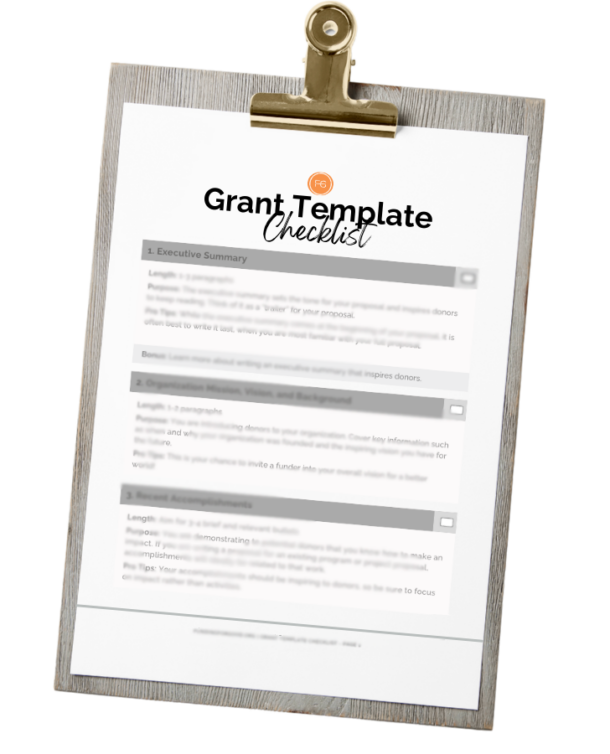Does grant research seem overwhelming?
Do you struggle to find foundations that want to fund your nonprofit’s current needs? Then you’ve come to the right place. Let’s delve into how to do grant research!
What Successful Grant Research Looks Like
When researching prospective foundation funders, your goal is to find a handful of well-matched funding prospects. “Well-matched” means the foundation’s funding priorities match your organization’s funding needs.
In the case of grant research, sometimes less really is more. Sending two grant proposals to two carefully selected prospects will deliver better results than sending 100 proposals to 100 random foundations.
Grant funding is also a slow process. It can take 6-9 months—or more!—to secure grant dollars from a new foundation. We tell folks to start planning and researching a year before you need the dollars in hand.
9 Expert Tips for Your Grant Research
Fundraisers are often tempted to jump straight into searching for grants online—usually by subscribing to a grants database like the Foundation Directory or GrantStation.
But before you log into a single database, we recommend taking a step back to make sure you understand what type of funding you need, for what, and by when. You cannot find that perfect “well-matched” prospect without understanding your organization’s priorities first.
To kick off your grant research, start with these nine tips.
1) Identify current needs
Meet with your organization’s leadership and program/project staff to generate a needs list for the next 12 months. You are specifically looking for needs that are not currently funded—or where renewal funding is not yet certain.
2) Prioritize your needs list
Work with your organization’s leadership to determine which items are needs versus wants, and which take priority. This will help you establish a focus for your grant research efforts.
3) Identify the cost associated with each need
Not only is it important to know your funding needs, but you must know how much these needs cost—and thus how much you need to raise. It is difficult to successfully identify prospects when you don’t know how much you will be asking for.
Many foundations have restrictions on award amounts, percentages of project costs they will fund, etc. If you start research without this data, you will not be able to exclude prospects whose parameters are outside your needs. For example, if a foundation only provides $10,000 grants for project support, and you need $100,000 in unrestricted support, that foundation will not be a great fit.
4) Establish a timeline for when you need the dollars in hand
For each funding need you identify, you also need to know when those dollars need to be received. This helps you evaluate grant deadlines, when grant proposals are reviewed, and when grant decisions can be expected.
Some foundations will allow you to pay yourself back if you spend money before the grant check arrives, but many will not. This is a question you need to ask before submitting a proposal. If the dollars won’t come in time for the project and you can’t pay yourself back for the expense, should you apply for the funding? Probably not.
5) Identify the program/project geographic focus
Many funders have geographic priorities. So, to determine which prospects might fund your organization, you need to know your service area. Are you serving one city or county? Are you serving multiple counties, a region of a state, an entire state, or multiple states? Or are you working nationally?
Once you determine your geographic focus, you can search for foundations that fund organizations in those same geographies. Note there is a difference in service area and impact area. Be sure you are able to identify both.
6) What is your organization’s total operating budget
Make sure you know your organization’s operating budget for the current and next fiscal year. Many foundations have limitations based on operating budget. Some may say they only support organizations with operating budgets of $250k or less. Other foundations only provide support to organizations with operating budgets over $1 million who have been operating for a set number of years.
7) Who has supported your organization in the past
Coming up with a list of prospects—who turn out to already be longtime funders—won’t get you far. That’s why you need to know which foundations are currently supporting your organization or have supported your organization in the past.
Gather a list of foundations that have funded your organization in the last several years. Include the foundation’s last gift date, amount, and purpose. If the foundation is no longer funding your organization, try to find out why and whether you can apply for funding again.
8) Who has declined a proposal in the past
Just as important as knowing which foundations have funded your organization, is knowing who has declined funding and why. Maybe a proposal was declined, but your group was encouraged to apply again the following year. Maybe a proposal was declined because it was a bad match, but now you have a better match. Perhaps a proposal was declined because the organization wasn’t a good fit for the foundation.
Knowing this information will help determine if you should or should not reach out to a foundation again and follow up on a new proposal. Often, this information gets lost in staff transitions. Especially for groups who are not working with donor software and tracking these types of notes. You may need to do a bit of sleuthing to find all the information you need.
9) Which organizations do similar work
Try to identify two or three nonprofit organizations that do similar work to your organization, as close to your region as possible. Then, go out and research who funded those organizations in the past.
You can cross-reference funders for these groups and see who has funded you and who has not. The foundations that have not yet funded your organization might be a great fit if they’ve funded similar organizations in your area.
Get Researching!
Grant research can be a lot of work. But if you prepare ahead of time and get the answers you need to be successful, you might be surprised at how much you can find and how quickly. If you still feel like you need some help with grant research, or you just don’t have the time to do it yourself, check out our Grant Research Package.


